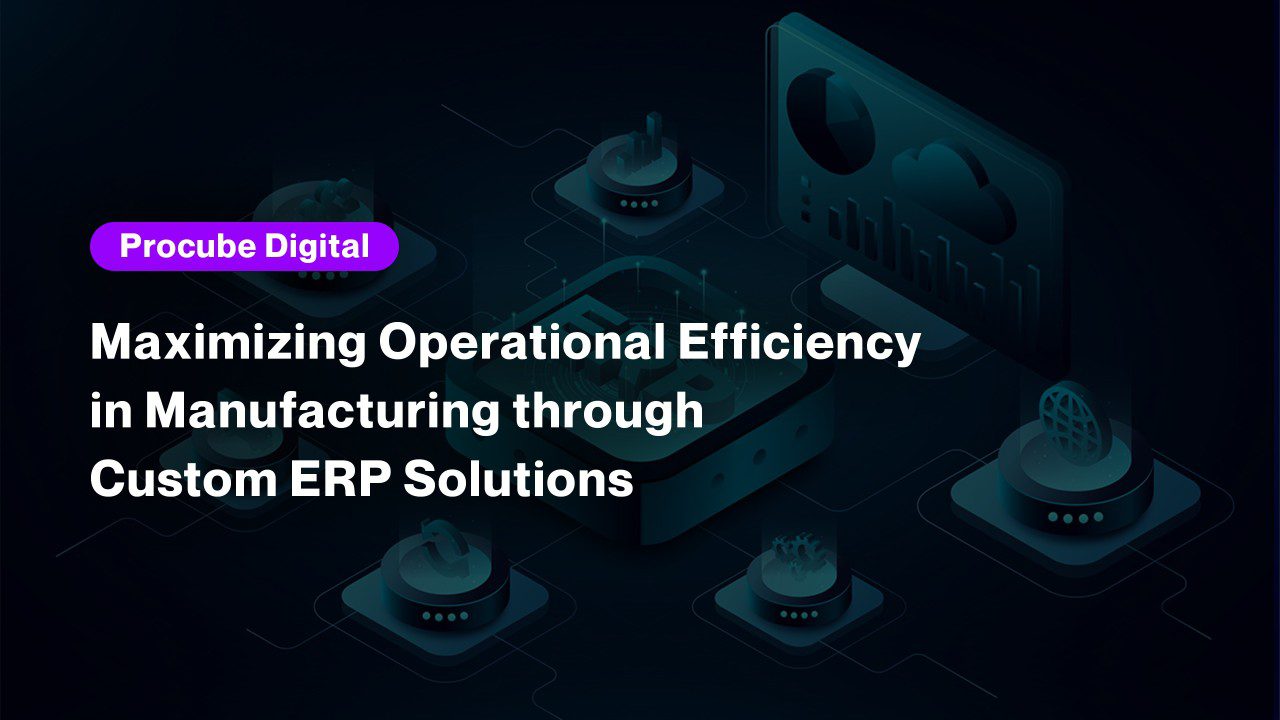“Improving Efficiency: Small Manufacturing ERP Solutions”
“Improving Efficiency: Small Manufacturing ERP Solutions”
Welcome to our article on “Improving Efficiency: Small Manufacturing ERP Solutions” where we will explore the benefits of utilizing small manufacturing ERP solutions to streamline operations and enhance productivity in your business. In today’s fast-paced and competitive market, it is essential for manufacturing companies to optimize their processes and maximize efficiency to stay ahead of the curve. By implementing a tailored ERP solution designed specifically for small manufacturing businesses, you can simplify complex tasks, improve decision-making, and boost overall performance. Let’s delve into the world of ERP solutions and discover how they can revolutionize your manufacturing operations.
Introduction to Small Manufacturing ERP Systems
Small manufacturing ERP systems are software solutions specifically designed for small to medium-sized manufacturers to streamline their business processes and increase efficiency. These systems help companies manage their production, inventory, sales, and financials all in one centralized platform. Small manufacturing ERP systems are tailored to meet the unique needs of smaller manufacturers, offering features that are scalable, customizable, and cost-effective.
One of the key benefits of small manufacturing ERP systems is their ability to integrate all aspects of the manufacturing process into one cohesive system. This integration allows for better communication and collaboration among departments, leading to improved decision-making and increased productivity. By centralizing all operations in one system, small manufacturers can eliminate duplicate data entry, reduce errors, and improve overall visibility into their operations.
Small manufacturing ERP systems also offer robust reporting and analytics capabilities, allowing companies to track key performance indicators, analyze trends, and make data-driven decisions. These systems provide real-time insights into production efficiency, inventory levels, order status, and financials, helping manufacturers identify areas for improvement and optimize their operations.
Another advantage of small manufacturing ERP systems is their ability to automate manual tasks and processes, such as order processing, invoicing, and inventory management. By automating these routine tasks, small manufacturers can free up time and resources to focus on more strategic initiatives, such as product development, customer service, and business growth.
Despite their many benefits, implementing a small manufacturing ERP system can be a complex and challenging process. Companies must carefully evaluate their needs, budget, and resources to select the right system for their business. It is essential to choose a system that is user-friendly, scalable, and customizable to meet the specific requirements of the manufacturing industry.
In conclusion, small manufacturing ERP systems are essential tools for small to medium-sized manufacturers looking to streamline their operations, increase efficiency, and drive business growth. These systems offer a wide range of benefits, including integrated processes, advanced reporting capabilities, and automation of manual tasks. By investing in a small manufacturing ERP system, companies can gain a competitive edge, improve decision-making, and achieve long-term success in the manufacturing industry.
Key Features and Benefits of Small Manufacturing ERPs
Small Manufacturing ERPs, or Enterprise Resource Planning systems, are essential tools for businesses in the manufacturing industry. These software solutions are designed to streamline and optimize the various processes involved in manufacturing operations, helping companies improve efficiency, reduce costs, and increase productivity. Here are some key features and benefits of Small Manufacturing ERPs:
1. Inventory Management: Small Manufacturing ERPs come equipped with advanced inventory management capabilities that allow businesses to track and manage their inventory in real-time. This feature helps companies avoid stockouts and overstock situations, minimizes inventory carrying costs, and ensures accurate inventory levels at all times.
2. Production Planning and Scheduling: One of the most critical features of Small Manufacturing ERPs is their ability to streamline production planning and scheduling processes. These systems help businesses create optimized production schedules, allocate resources efficiently, and ensure timely delivery of products to customers. By automating and centralizing these tasks, Small Manufacturing ERPs help companies meet customer demand, reduce lead times, and improve overall operational efficiency.
3. Quality Control: Small Manufacturing ERPs include robust quality control tools that enable businesses to monitor and maintain product quality throughout the manufacturing process. These systems help companies track and analyze key quality metrics, identify defects or issues early on, and implement corrective actions to improve product quality and reduce the risk of defects or recalls.
4. Cost Management: Small Manufacturing ERPs provide businesses with comprehensive cost management functionality that helps them track and analyze production costs, overhead expenses, and other financial metrics. This feature allows companies to identify cost-saving opportunities, optimize their cost structure, and improve profitability in the long run.
5. Real-Time Reporting and Analytics: Small Manufacturing ERPs offer powerful reporting and analytics tools that enable businesses to generate real-time insights into their operations. These systems provide managers and decision-makers with actionable data and KPIs that help them make informed business decisions, identify trends, and drive continuous improvement in manufacturing performance.
6. Scalability and Flexibility: Small Manufacturing ERPs are highly scalable and flexible, allowing businesses to adapt and grow as their operations evolve. These systems can easily accommodate changes in production volume, product lines, or business processes, making them an ideal solution for small and medium-sized manufacturing companies looking to expand and compete in an increasingly competitive market.
In conclusion, Small Manufacturing ERPs offer a wide range of key features and benefits that can help businesses streamline their operations, improve efficiency, and achieve sustainable growth. By leveraging the capabilities of these powerful software solutions, manufacturing companies can enhance their competitiveness, increase customer satisfaction, and drive profitability in the long term.
Implementing a Small Manufacturing ERP
Implementing a Small Manufacturing ERP system can be a game-changer for small businesses looking to streamline their operations and improve efficiency. However, implementing such a system requires careful planning and execution to ensure a smooth transition and maximize the benefits. Here are some key steps to consider when implementing a Small Manufacturing ERP:
1. Assess Your Current Processes: Before implementing a Small Manufacturing ERP, it is essential to assess your current processes and workflows. This will help you identify areas that can be improved or automated with the ERP system. Make sure to involve key stakeholders from different departments in this assessment to get a comprehensive understanding of your business operations.
2. Choose the Right ERP Solution: With the plethora of Small Manufacturing ERP solutions available in the market, it can be overwhelming to choose the right one for your business. Consider factors such as industry-specific features, scalability, ease of integration, and user-friendliness when evaluating ERP systems. It is also essential to consider your budget and choose a system that offers the best value for your investment.
3. Develop a Customization Plan: While most Small Manufacturing ERP systems come with pre-configured modules and features, every business is unique, and customization may be necessary to meet specific requirements. It is crucial to develop a customization plan that outlines the modifications needed to tailor the ERP system to your business processes. This plan should include a detailed scope of work, timeline, and budget for customization efforts.
4. Build a Cross-Functional Implementation Team: Implementing a Small Manufacturing ERP system is a complex process that requires collaboration across different departments. Build a cross-functional implementation team consisting of representatives from IT, operations, finance, and other relevant departments. This team will be responsible for overseeing the implementation process, resolving any issues that arise, and ensuring that the ERP system aligns with the overall business goals.
5. Provide Training and Support: Transitioning to a new ERP system can be challenging for employees who are used to working with traditional processes. Providing adequate training and support is crucial to ensure a smooth adoption of the Small Manufacturing ERP. Consider organizing training sessions, workshops, and providing resources such as user manuals and online tutorials to help employees familiarize themselves with the new system.
6. Monitor and Evaluate Performance: Once the Small Manufacturing ERP system is implemented, it is essential to monitor its performance and evaluate its impact on your business operations. Regularly track key performance indicators (KPIs) such as production efficiency, inventory accuracy, and customer satisfaction to gauge the effectiveness of the ERP system. Use this data to identify areas for improvement and make necessary adjustments to maximize the benefits of the ERP system.
By following these key steps and investing time and resources in the implementation process, small manufacturing businesses can successfully adopt a Small Manufacturing ERP system and reap the benefits of improved efficiency, streamlined processes, and enhanced decision-making capabilities.
Common Challenges Faced by Small Manufacturers in ERP Implementation
Implementing an ERP system can be a daunting task for small manufacturers. While the benefits of such a system are clear, there are several challenges that companies may face during the implementation process. Below are some of the common challenges faced by small manufacturers in ERP implementation:
1. Limited Resources: One of the biggest challenges for small manufacturers is having limited resources, both in terms of budget and personnel. ERP implementation can be costly, and small companies may not have the financial flexibility to invest in a full-scale system. Additionally, small manufacturers may lack the IT staff needed to support and maintain the system, leading to delays in implementation and ongoing challenges with system management.
2. Resistance to Change: Another common challenge faced by small manufacturers is resistance to change among employees. Implementing an ERP system often requires employees to learn new processes and ways of working, which can be met with resistance and pushback. This resistance can slow down the implementation process and hinder the adoption of the new system, ultimately impacting the success of the ERP implementation.
3. Data Migration and Integration: Small manufacturers may also struggle with the migration and integration of existing data into the new ERP system. Legacy systems may not be compatible with the new system, leading to challenges in transferring data and ensuring that it is accurate and consistent. This can result in data errors, duplicate records, and other issues that impact the functionality and effectiveness of the ERP system.
4. Training and Support: Training and ongoing support for employees are crucial components of a successful ERP implementation, but small manufacturers may struggle to provide adequate training and support. Limited resources may restrict the company’s ability to invest in training programs, leaving employees to learn the new system on their own. This can lead to confusion, frustration, and decreased productivity as employees struggle to adapt to the new system.
In conclusion, small manufacturers face several challenges when implementing an ERP system. Limited resources, resistance to change, data migration and integration issues, and training and support are just a few of the common challenges that companies may encounter. Overcoming these challenges requires careful planning, communication, and a focus on the long-term benefits of the ERP system. By addressing these challenges proactively, small manufacturers can successfully implement an ERP system that improves efficiency, productivity, and overall business performance.
Trends in Small Manufacturing ERP technology
As technology continues to advance, small manufacturing ERP systems are also evolving to meet the changing needs of businesses. Here are some key trends shaping the future of small manufacturing ERP technology:
1. Cloud-based ERP solutions: One of the biggest trends in small manufacturing ERP technology is the shift towards cloud-based solutions. Cloud ERP systems offer a more flexible and scalable option for small manufacturers, allowing them to access their data and software from anywhere with an internet connection. This trend is driven by the increasing need for mobile capabilities and remote work options, which have become even more crucial in light of the COVID-19 pandemic.
2. Integration with IoT devices: The Internet of Things (IoT) is increasingly being integrated into small manufacturing ERP systems to provide real-time data on production processes, equipment performance, and inventory levels. By connecting IoT devices to ERP software, manufacturers can gain valuable insights to improve efficiency, reduce downtime, and make more informed business decisions.
3. AI and machine learning capabilities: Small manufacturing ERP systems are incorporating artificial intelligence (AI) and machine learning algorithms to automate tasks, predict trends, and optimize processes. These advanced technologies can help small manufacturers streamline operations, improve forecasting accuracy, and enhance overall efficiency.
4. Focus on cybersecurity: With the rise of cyber threats targeting small businesses, cybersecurity has become a top priority for small manufacturing ERP vendors. Security features such as encryption, multi-factor authentication, and regular software updates are essential for protecting sensitive data and preventing cyber attacks. Additionally, compliance with industry regulations such as GDPR and HIPAA is becoming increasingly important for small manufacturers.
5. Customization and scalability: Small manufacturers have diverse needs and requirements, which is why ERP vendors are focusing on providing customizable and scalable solutions. Customization allows businesses to tailor the ERP system to fit their specific workflows and processes, while scalability ensures that the system can grow along with the business. This trend is particularly important for small manufacturers looking to expand their operations, enter new markets, or diversify their product offerings. By offering flexible and adaptable ERP solutions, vendors can help small manufacturers stay competitive in an ever-changing industry landscape.
In conclusion, small manufacturing ERP technology is constantly evolving to meet the unique challenges and opportunities faced by small businesses in the manufacturing industry. By embracing these trends, small manufacturers can streamline operations, improve efficiency, and drive growth in a rapidly changing market.







